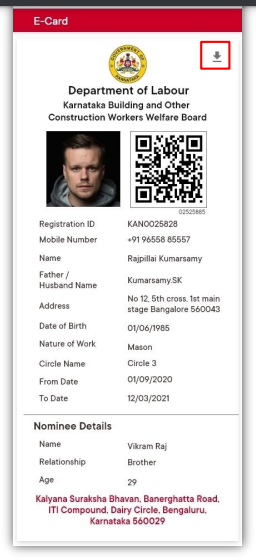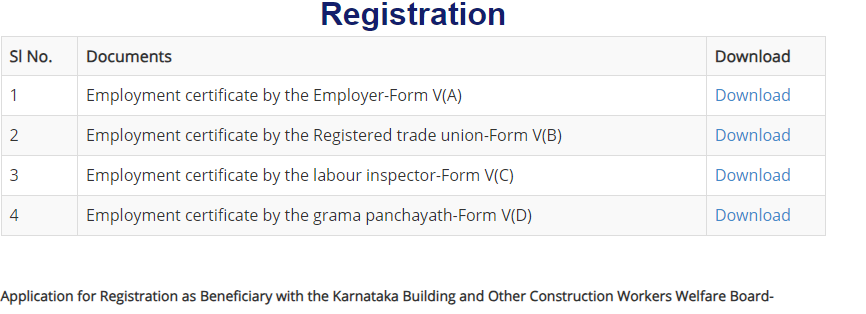Step 1: Getting the labour card
What is a BoCW labour card?
A BoCW labor card is an official identification card issued to construction workers who are eligible under the BoCW Act. This is the first basic document required to avail entitlements under the BoCW Act.
The card requires renewal: annually or once in 3 years.
What are the requirements to get a labour card?
- Employment certificate- proof of having engaged in building and other construction (B&OC) work for a minimum of 90 days in the previous year.
Click here to download the 90-day work certificate template
The employment certificate is validated by a labor inspector and employer/ registered labor union/ gram panchayat.
- Age- between 18 and 55 years
- Age proof- Voter ID or Aadhaar card
- Aadhaar card- linked to a mobile number
- Bank passbook copy
- Ration card
With a recent change in guidelines ration card is not mandatory now; till 6 months back this was a required document for labour card renewal.
- Nominee's bank pass book copy
- Nominee and children's correct name and age details
If nominee and children's details are not provided at this time or are incorrect, it will lead to difficulty in availing benefits under various schemes.
Common reasons why construction workers fail to receive the benefits under BoCW schemes
Lack of awareness and trust among workers
-
In extreme cases, workers who have been in this occupation for 20 years don't know about their entitlements.
- Once application gets rejected there is no refund. So, workers are apprehensive of wasting money and go via agencies.
Applicants, especially recent migrants, are hesitant to disclose all documents and information to CSOs (Civil Society Organizations).
Lack of supporting
documents-
- Many times workers leave their necessary documents at native place when they come for work, especially migrants from UP & Bihar
- Having a bank account with an Aadhar-linked mobile phone is a prerequisite, and many workers either do not
meethavethisanrequirementaccount and/ or Aadhar card or the account is not linked with their Aadhar. - Names, age and address don’t match in different
docsdocuments
Petty laborers often face challenges in obtaining the seal or signature of contractors for work certificates since they work irregularly at various sitessites.
resources-
-
Lack of access to smart phones and in many cases a single phone number used by multiple members of the household. With a single phone number, if both father and son are laborers, only one gets the benefit albeit both have phone linked Aadhaar cards.
- In certain instances, workers' essential documents are kept
atin their hometowns, and their families there do not possess smartphones to send images of necessary documents, such as Aadhar cards, ration cards, PAN cards, and bankpassbookspassbooks.
Workers often change their phone numbers frequently, and their Aadhar numbers may not be linked to their current phone numbersnumbers.
Lack of cooperation
- Some CSOs charge a fee to applicants for assisting in the application process for cards or schemes.
LackOnce of cooperation
Applicants are reluctant to share all docs/ information with CSOs. This is especially true for recent migrants.Oncethe application gets rejected there is no refund. So, workers are apprehensive of wasting money and go via agencies.Some
Policy design
issues-
- Migrants often require a local address to benefit from various schemes, but they are reluctant to change their address due to concerns about missing out on opportunities in their home states or to preserve important documents and proofs.
On-ground implementation issues-
issues
Gardeners, parking area employees etc. roles not considered CW (trades like mason, plumber, electrician etc. are considered part of CW).
Mainly with respect to pension, registration should be done before the age of 55.
Labour should be registered as a labourer with the District Labour Office in his/her circle area.
- Petty labourers don’t get the seal/ sign of contractors as they work irregularly at different site
- Physical verification of hands to figure out person is working with sand and cement
At
-
Another example: a person drives a vehicle supplying water on construction sites. When the labour inspector calls for verification, he says I am a driver. So, the application gets rejected.
Once
At getsthe rejected there is no refund. So, workers are apprehensivetime of wastingverification, moneyworker andmay goswitch viato agencies.another rephraseworksite hence
not available on previous construction site where he applied from.
Name, age and address don’t match in different documents.
Requires dedicated bank account passbook; many workers lack a bank account and not carrying bank passbook.
seeding-
-
Aadhar-mobile link mandatory, but worker's frequent number changes cause repeated linking.
-
Single mobile number for many individuals.
No Android phone hampers remote Aadhar copy sharing, if cards at hometown.Weak network or on-site work delays OTP receipt.
Hard labor affects accurate bio-metric fingerprints.
For all Aadhaar linkage work, OTP comes to the applicant’s phone but they refuse to cooperate because they are at work or don’t see phones for a long time. So this applicationRegistration process
needs to be repeated multiple times as OTP has time-bound validity.
Registration process-
-
Most laborers unaffiliated with CSOs, often resort to costly cyber-cafés; rejections lead to money loss, discouraging scheme registration.
- Some CSOs take money from applicants to apply for cards/ schemes
-
Cyber center also bribes officers to get work done. Workers don’t remember the login details which remain with CSO.
Once application gets rejected there is no refund. So, workers are apprehensive of wasting money and go via agencies.
Cyber centers often bribe officers to get work done.
Annual Renewal-Renewal
Muster roll or pay slip is
required-required for renewal. It is not possible to obtain for muster roll for ‘gig’ workers withinCW.this occupation.
Trade unions can provide work certificate for 90 days but cannot provide muster rolls.
Dept is not accepting renewals w/o muster roll because many non-construction workers have enrolled. They are awaiting new format of muster rolls from the dept now. Workers with big builders don't have a problem.
-
Physical verification of hands to figure out person is working with sand and cement.
-
At the time of verification, worker may switch to another worksite hence not available on previous construction site when he applies.
The labor card requires renewal either annually or every three years. Workers, often failing to keep track, experience delays in renewal, leading to a loss of access to benefits.
Examples of CSOs going the extra mile to get work done
- Certain CSOs enroll construction workers into unions, and these unions assume the comprehensive responsibility for addressing labor card issues, including renewal, corrections, and updates, such as Sampark and Grakoos.
- Mitr Sanketa takes an additional step by liaising with government departments to personally collect the paperwork required for laborers' card applications and access to various schemes.
- CFAR have set up a CSC (customer service centre) so can apply for schemes etc directly.
Annexure:
90-day work certificate template page
Link to download labour registration form


